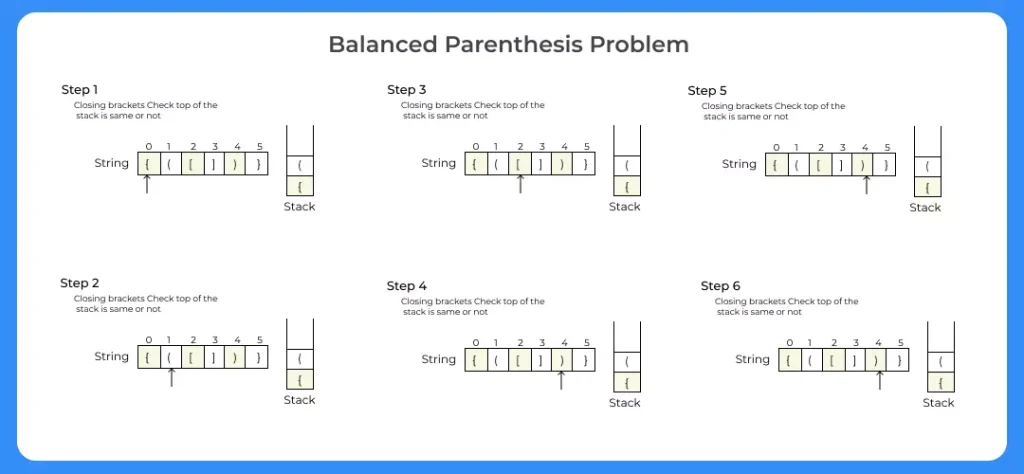Program to Check Balanced of Parenthesis in Python
Check the balance of parenthesis in Python
To check balanced parenthesis is a basic interview question where we are asked to find whether the given string(of brackets) is balanced or not. To do this , the traditional way of doing is using stacks but we can also find by using normal programming techniques. Different brackets are ( ) , [ ] , { }. Question can be asked on any type of bracket or of all types of brackets.


Missing Braces Program in Python Working:
- Step 1: Take the input string
- Step 2: Call the isbalanced function
- Step 3: This function returns True if the string is balanced, else False
- Step 4: This function returns true or false for the string that contains ( )
Python code:- Check the balance of parenthesis in Python
Run
def isbalanced(s):
c= 0
ans=False
for i in s:
if i == "(":
c += 1
elif i == ")":
c-= 1
if c < 0:
return ans
if c==0:
return not ans
return ans
s="{[]}"
print("Given string is balanced :",isbalanced(s))
Given string is balanced : True
Working:
This approach is to check whether the string is balanced or not in case the string contains several types of brackets like { ( [ ] ) }
- Step 1: Take the input string
- Step 2: Call the isbalanced function
- Step 3: This function returns True if string is balanced , else False
- Step 4: This function replaces the set of brackets until the string len becomes zero
Solution 2:
Run
def isbalanced(s):
while(len(s)!=0):
s=s.replace('()','')
s=s.replace('[]','')
s=s.replace('{}','')
if(len(s)==0):
return True
else:
return False
s=input("Enter a string of brackets:")
print("Given string is balanced:",isbalanced(s))
Enter a string of brackets: ({{}}){}[]
Given string is balanced : True 




char=input()
num=len(char)
while num>0:
char=char.replace(‘()’,”)
char=char.replace(‘[]’,”)
char=char.replace(‘{}’,”)
num-=1
if len(char)==0:
print(True)
else:
print(False)
class Solution:
def isValid(self, s: str) -> bool:
for i in range(len(s)//2+1):
s=s.replace(“()”,””)
s=s.replace(“{}”,””)
s=s.replace(“[]”,””)
if len(s)==0:
return True
else:
return False
Hey, join our Discord Channel for technical queries
def is_balanced_parentheses(s):
stack = [] # Create an empty stack to store opening brackets
opening_brackets = ‘([{‘
closing_brackets = ‘)]}’
for char in s: # Loop through each character in the input string
if char in opening_brackets: # Check if the character is an opening bracket
stack.append(char) # Push the opening bracket onto the stack
elif char in closing_brackets: # Check if the character is a closing bracket
if not stack: # If the stack is empty, no matching opening bracket exists
return False
if opening_brackets.index(stack.pop()) != closing_brackets.index(char):
return False # If the opening bracket on top of the stack doesn’t match the closing bracket, return False
return len(stack) == 0 # After processing all characters, if the stack is empty, the brackets are balanced
# Test cases
test_strings = [
“()”, # Balanced
“([])”, # Balanced
“{[()]}”, # Balanced
“{[()]”, # Not balanced
“({})”, # Balanced
“((())())”, # Balanced
“())(“, # Not balanced
]
for test_string in test_strings:
if is_balanced_parentheses(test_string):
print(f”‘{test_string}’ is balanced.”)
else:
print(f”‘{test_string}’ is not balanced.”)
Hey Please join our TA Support Group on Discord, where we will help you out with all your technical queries:
?Discord
Both of the code give false Output
Code 1 will return wrong output for string: “{ ] [ }”
and code 2 is showing and infinite loop
a=”[](}”
c=0
for i in a:
if i==”(“:
c+=1
elif i==”)”:
c-=1
elif i==”[“:
c+=2
elif i==”]”:
c-=2
elif i==”{“:
c+=3
elif i==”}”:
c-=3
if c==0:
print(a,”Balanced”)
else:
print(a,”Not balanced”)